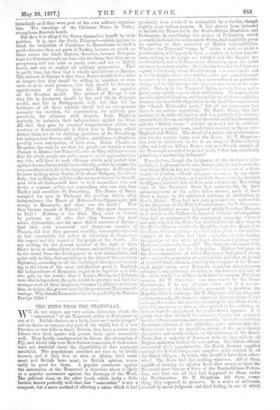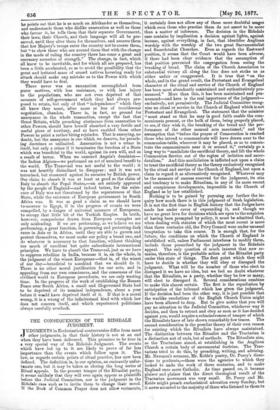THE NEWS FROM THE TRANSVAAL.
WE do not expect any very serious discussion about the " annexation " of the Transvaal, either in Parliament or out of it. British electors, as a body, have no "earth-hunger," and no desire to conquer any part of the world, but if a new Province or two falls to Great Britain, they have a serene con- fidence that their agents will govern them quite reasonably well. They hardly condescended to discuss the absorption of Fiji, and would take over New Guinea to-morrow, if their rulers were not doubtful about the digestibility of that enormous mouthful. The populations absorbed are sure to be kindly treated, and if they live in Asia or Africa, kind treat- ment and British laws must, in British opinion, neces- sarily be good for them. A popular movement against the annexation of the Transvaal is therefore about as likely as a popular movement against the drainage of the Wash. The political class,, on the other hand, which looks a little farther, knows perfectly well that this "annexation" is not a conquest, but a mere method of effecting a union which it had
previously been resolved to accomplish by a similar, though slightly more tedious process. It had always been intended to include the Transvaal in the South-African Dominion, and ' Parliament, in sanctioning the project of Federation, which avowedly included the independent States, had implicitly given its sanction to that extension of British responsibilities. Whether the Transvaal "came in" under a vote or under a proclamation, will appear to them a matter of minor import- ance, so long as its people are satisfied and the Empire not overburdened, and a Parliamentary discussion upon the point can have no serious results. As to the burden, that had been ac- cepted beforehand, when Confederation was sanctioned ; and as to the people, those who neither resist nor complain must be taken to be convinced that they have suffered no particular wrong, and in this instance the acquiescmce seems to be com- plete. Nobody in the Transvaal fights, nobody hisses, and a great many openly express their satisfaction. Of course, there are discontented farmers, and by-and-by we shall see coalitions between the inevitable Opposition in the local Government and the "Dutch Nationalist party," but all accounts agree that there is no serious opposition. Sir Bartle Frere, who had nothing to do with the matter, and is a perfectly fair witness, reports that all seem satisfied that the event could not be avoided, and the "British troops " ordered up would not be sufficient to overawe a country town, much less a cot miry as big as twice England and Wales. The dread of a native war of extermina- tion has for months hung over the Beers. Sir T. Shepstone has only to withdraw, to let in an army of Zulus carrying rifles and bent on killing Boers ; and as a French colonist of the Transvaal remarked to us last week, "that has, one clearly perceives, a moderating influence."
Nevertheless, though the judgment of the electors is quite certain, it is pleasant to be sure that no mistake has been made, that Great Britain has not terminated the exi:itence of a State worthy of freedom without adequate reason, or by any direct exertion of physical force, and on both these points the detailed intelligence received this week is most satisfactory. The ruling class in the Transvaal State had undoubtedly, by their mismanagement of the native tribes around, made of their State a danger to the continued existence of civilisation in South Africa. They had not only provoked the natives till, in the judgment of the British Commissioner, Sir T. Shepstone, they had justified war—a judgment which President Burgers, in a speech to the Volksraad, repeated without refuting—but they had so mismanaged the consequent campaign 'that it not only crippled the State, but disclosed for the first time to the Native Powers outside the Republic, from the Zambesi to the Cape, the great change that had taken place in the relative strength of the white and black races, thus at once shaking the prestige of the white in South Africa, and placing every European community in peril." The State was hemmed in by black armies eager for its destruction. Matters had gone so far, that communities of white Dutchmen had placed them- selves under the protection of native chiefs, and that an inroad of 100,000 black riflemen, elated by the conquest of the Trans- vaal, might sweep away European dominion altogether,—a calamity it was necessary to avert, in the interest not only of the whole world, but of these dark races themselves. For these reasons, Sir T. Shepstone was empowered by the Home Government, if he saw adequate cause and if a reason- able number of the inhabitants consented, to proclaim the Republic British territory. Sir T. Shepstone did see adequate causes,—namely, the immense cause rye have mentioned, and as a smaller cause, the anarchy prevailing in the State itself ; and dhl, moreover, see reason, since proved to be sufficient, to believe that the majority of the people would approve. It is , pretty clear that the local Government, though not prepared to say, "Please annex us, and save trouble," thought annexation the easiest solution of the difficulty; quite certain that this Government made no opposition, except of the most formal character ; and nearly certain, on the testimony of Sir Bartle Frere, that a majority of Boers, as well, we may add, as all English residents, desired the annexation. The Dutch officials reaccepted their appointments, the Dutch farmers supplied carriage for British troops, and complete order existed in all the Dutch villages. In truth, why should it have been other- wise ? The Boers had lost nothing whatever. All of them capable of forming an opinion knew that sooner or later the Transvaal must become a State of the South-African Federa- tion, and that was all that had happened to them under the Proclamation. Sir T. Shepstone left them every- thing they expected to preserve. In a series of addresses, marked by much judgment and kind feeling, in one of which he points out that he is as much an Afrikander as themselves, and understands those who dislike annexation as well as those who favour it, he tells them that their separate Government, their laws, their Church, and their language will all be pre- served, until they alter them for themselves, and assures them that her Majesty's troops enter the country not to coerce them, but "to show those who are around them that with the change in the mode of ruling the country there has come a great and necessary accession of strength." The change, in fact, which all knew to be inevitable, and for which all are prepared, has been a little accelerated, so as to avoid the possibility that the great and irritated mass of armed natives hovering ready for attack should make any mistake as to the Power with which they would have to deal.
There never was an annexation accomplished from purer motives, with less resistance, or with less injury to the populations, who are not even deprived of that measure of self-government which they had always pro- posed to retain, but only of that " independence " which they all knew they must, after more or less of troublesome negotiation, abandon. There is, in fact, no ground for annoyance in the whole transaction, except the fact that Great Britain, while preaching abstinence from annexation to other Powers, should have herself absorbed a very fertile and useful piece of territory, and so have enabled those other Powers to point a rather biting rejoinder. That is annoying, no doubt, but the annoyance is one which we deserve, for preach- ing doctrines so unlimited. Annexation is not a crime in itself, but only a crime if it terminates the freedom of a State which was beneficial to the world, against its own will, and as a result of terror. When we annexed Angria's dominion— the Indian Algiers—we performed an act of unmixed benefit to the world. The Transvaal was not useful to the world ; it was not heartily disinclined to disappear ; and it was not terrorised, but reassured against its enemies by British power. Our claim to absorb it was at least as good as the claim of Italy to absorb the Papal States,—an act entirely approved by the people of England—and indeed better, for the exist-. ence of Italy was not threatened by the separateness of that State, while the existence of European government in South Africa was. It was as good a claim as we should have to-morrow to Egypt, if in the progress of events we were compelled, by a danger of universal massacre of Europeans, to occupy that little bit of the Turkish Empire. In truth, however, comparisons drawn from European examples are only misleading. If we are performing, as we believe we are performing, a great function, in governing and protecting dark races in Asia or in Africa, until they are able to govern and protect themselves, we must make our policy a broad one, and do whatever is necessary to that function, without thinking too much of excellent but quite subordinate international principles. We have to absorb the Transvaal, just as we have to suppress rebellion in India, because it is, on the whole, in the judgment of the wisest Europeans—that is, of the wisest of our day—beneficial to mankind that we should do it. There is no other moral justification for our acts, and in appealing from our own consciences, and the consensus of the civilised world to European precedents, we are only wasting time. In the progress of the work of establishing the Roman Peace over South Africa, a small and ill-governed State had to be deprived of its nominal independence, about a year before it would have deprived itself of it. If that is a moral wrong, it is a wrong of the infinitesimal kind with which law does not concern itself, and which experienced politicians always carefully overlook.



































 Previous page
Previous page